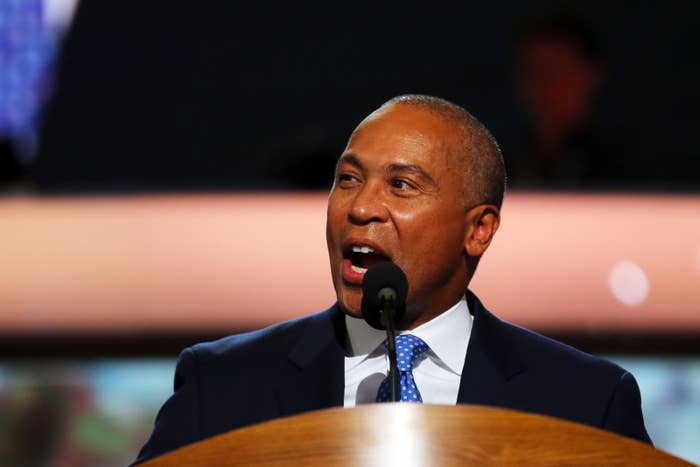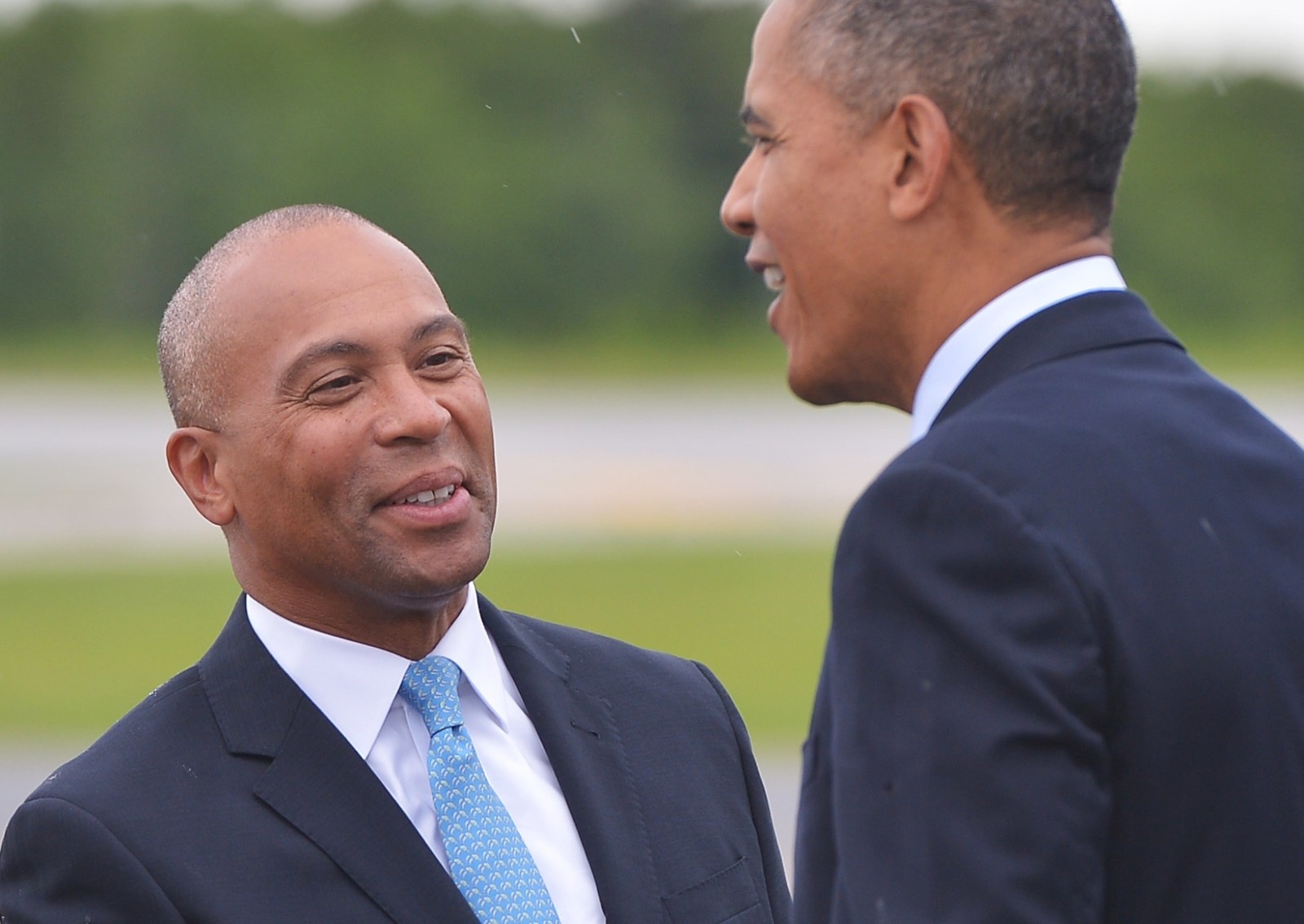
In 2004, Massachusetts Democrats were devastated by John Kerry’s loss, one that rendered the national party rudderless and confused after an election they'd been sure they’d win.
The party struggled with its identity and direction. The party still couldn’t agree on what happened. Was a Vermont progressive who’d lost the primary the new, more viable direction for the party?
It was then that Deval Patrick decided he would get out of the private sector, back into politics, and run for executive office.
In 2018, Democrats face many of the same questions. And Patrick, on the other side of two terms as governor, is again considering a run for office — but this time for president of the United States.
People who know and have spoken with Patrick say they see parallels between that moment and this one — though it is unclear to the half-dozen people who have spoken with Patrick if he’s actually going to go through with it.
What is clear, though, is since the 2016 election, Patrick has reentered national politics despite his continued work for Bain Capital — the source of many attack ads against fellow former Massachusetts governor Mitt Romney in 2012. He’s endorsing candidates. He’s meeting with donors. He’s said that he has planned on speaking with his family, which recently gathered in his home in Western Massachusetts, according to two sources with knowledge of the get-together. The sources, however, said they were not privy to any discussions Patrick may or may not have had with family members about politics or his future. Two sources said Patrick’s brain trust will meet in two weeks and politics are likely to be on the agenda. (Close Patrick adviser and spokesperson Doug Rubin declined to comment for this story. “He is focused on the 2018 midterm elections and wants to be helpful to Democratic candidates this year,” he said in an email.)
“It was clear that we Democrats were united against Bush and his policies. It became less and less clear, however, what we were for."
Notably, Patrick has also offered some criticism of the party. In the days following Hillary Clinton’s loss, for instance, he sent a 1,100-word email to supporters and friends addressing the election that immediately got pushed out to various members of the media. “Sad, disturbed, embarrassed — but not surprised,” Patrick wrote, arguing that the Democratic message in 2016 was opposition; the most important thing was voting against Trump. “That’s more than a bitter irony but a profound reminder to us of how important it is for Democrats to stand for what we say we believe.”
It sounded tonally similar to his dismay more than a decade earlier. “It seemed to me that the Democrats had lost the will to champion values and to be a voice of optimism,” he wrote in 2011 of his feelings after Kerry lost.
“Throughout his primary campaign, he tapped a yearning for change felt by many Democrats, but something was missing,” Patrick wrote. “It was clear that we Democrats were united against Bush and his policies. It became less and less clear, however, what we were for. Then Obama addressed the Democratic National Convention in Boston.”
Patrick went for 2006 in part, he’s said, because the party had abandoned its optimism crusade. He went on to run for governor as a relative unknown, going on to become the second black American man to be elected governor in the nation’s history.
Party insiders — and especially those who supported Obama in 2008 — see Patrick as a uniter, and a prospective candidate whose speaking abilities, stature as a two-term governor, and commitment to the politics of conviction, could serve as an effective antidote to Donald Trump. In 2006, Patrick once memorably turned an backhanded compliment about his oratorical skills into a tribute to foundational American principles, closing, “Let me say it before any of you do, I am no Dr. King. I am no John Kennedy. I am no Franklin Roosevelt, or Thomas Jefferson. But I do know that the right words spoken from the heart with conviction because of a vision of a thing beyond our reach, and a faith in the unseen, can be a call to action.”
Eric Holder, the ultimate Obama ally who himself is considering a run for president, recently said that as a citizen he’d be looking for someone with a vision and experience, and someone with the physical and mental strength to endure the rigors of the job. Then, he started to emphasize what he really felt about what the country needed.
“It has to be somebody who also has the ability to inspire people, to make people believe that government can be a force for good.”
Holder was in Patrick’s neighboring state of New Hampshire to promote the work he’s doing with the National Democratic Redistricting Committee. He continued, “and make people believe in this thing called America and move people to bring us together in ways this president has clearly not done.” Did he think Patrick fit that criteria?
“Yeah,” Holder told BuzzFeed News nonchalantly. “I’ve known Deval for a while; we’ve known each other for years. I think he was a good, two-term governor and I think he checks those boxes.”
It’s hard to know what Democratic voters will want in 2020. Patrick, who’s been clear he thinks competitive primaries are healthy, seemed annoyed by the air of inevitability around Clinton in 2016, but told BuzzFeed News in 2015 he did not mean that as a criticism of Clinton herself. Once asked “Will there be a Hillary-Deval ticket?” by a reporter, Patrick said no and laughed. Then he started laughing again.
Top national Democratic strategists said that Patrick has specific strengths as a candidate, particularly in a crowded primary, and particularly in two of the first primary states: New Hampshire and South Carolina. (Even when Patrick wasn’t widely expected to run last time around, Clinton aides still listed him in notes for a 2014 meeting — according to a leaked email that was hacked as part of a Russian influence campaign — under “potential competition and key endorsements,” along with Elizabeth Warren and Joe Biden.)

“Gov. Patrick is an intriguing candidate for me because he’s the only candidate that I'm aware of that could do well in New Hampshire by virtue of so much of New Hampshire being in the Boston media market,” said Jarrod Loadholt, a top Washington-based Democratic campaign strategist. “The 2016 race became mathematically difficult for Bernie Sanders after Hillary Clinton swept the South.”
Another Democratic strategist told BuzzFeed News that two of the doctrines of Democratic politics that came out of the 2004 presidential election explain Patrick’s attractiveness: Some people inside the party thought Kerry got labeled a fraud based on a lie because he didn’t hit back hard enough, and that the next presidential candidate needed to be a puncher. Others warned against retreading the last election — they believed that the Democratic electorate wanted something to vote for, rather than against; they wanted a melody, not a fight song.
The aforementioned strategist, who commented on Patrick on the condition they not be identified, said that Patrick could be successful if he tries to run because of who he is: He won’t try to out-Trump Trump; he’ll be a unifier, and doesn’t like scorched-earth politics.
“The same things that attracted me to Barack Obama attracted me to Deval Patrick,” David Axelrod told Politico in 2010.
An episode from 2014, though, offers some insight into how Patrick operates: Toward the end of his time as governor, Patrick decided that Massachusetts would emphatically welcome the unaccompanied minors who crossed the border in large numbers during summer 2014 largely from Central America — an issue of fraught politics at the time relevant to the current moment. He gave a big speech, making explicit appeals to faith, and invoked the Holocaust. “Once, in 1939, we turned our backs on Jewish children fleeing the Nazis, and it remains a blight on our national reputation,” said Patrick at the press conference. “The point is that this good nation is great when we open our hearts and our doors to needy children and diminished when we don’t.”
The Patrick aide said what stood out about the whole experience was how swiftly the entire thing happened: Patrick made the decision suddenly, but with enough conviction that staff immediately began carrying out the details, despite there being only a few hours to put the rollout together. “Everyone was like, ‘That just happened.’ Then it’s go-time and it’s awesome.”


